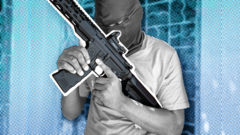An in-depth analysis reveals how the flow of U.S. firearms into Haiti supports escalating gang violence, highlighting lax regulations, suspected corruption, and insufficient oversight in customs enforcement.
The Illicit Arms Trade: US Guns Fueling Haitian Gang Violence

The Illicit Arms Trade: US Guns Fueling Haitian Gang Violence
A BBC investigation unveils the complexities of arms smuggling from the US to Haiti, revealing systemic issues that allow traffickers to thrive despite international embargos.
The delivery of assault rifles and handguns, concealed within food and clothing, has laid bare a troubling reality about the flow of firearms from the United States to the beleaguered nation of Haiti. The weapons shipment, intercepted by Haitian authorities in April 2024, exemplifies a broader issue of arms trafficking that is exacerbating the ongoing crisis on the island. An investigation by BBC World Service and BBC Verify has traced the origins of the shipment, revealing a precarious nexus of lax laws and corruption that allows traffickers to exploit the system.
The seized arms, including 12 assault rifles and 14 pistols along with nearly 1,000 rounds of ammunition, were shipped from Fort Lauderdale, Florida to Cap-Haitien, Haiti. According to reports, the equipment was packaged in boxes falsely labeled as containing clothing. A local resident, who unknowingly leased space in the container, discovered the truth about the cargo only after the shipment was apprehended.
Haiti's escalating gang violence, compounded by a wave of insecurity in the capital Port-au-Prince, has led to national instability and social unrest. The United States, often dubbed a "supermarket" for illegal arms trafficking by experts, continues to have limited oversight of outgoing shipments. Although there have been reports of increased inspections, the majority of containers leaving Florida for Haiti remain unchecked. Bill Kullman, a former official at the Bureau of Alcohol, Tobacco, Firearms, and Explosives (ATF), described the enforcement measures as disordered, emphasizing the sheer volume of cargo that makes thorough inspections nearly impossible.
In the wake of the arms discovery, investigations have implicated several individuals in the smuggling network, including a customs broker who has since gone into hiding. The UN has reported rampant corruption within Haitian customs, further complicating efforts to stem the tide of illicit firearms. With gangs currently controlling vast territories in Port-au-Prince, the repercussions of this unchecked trafficking are dire. The UN's statistics revealing 5,601 violent deaths from gang-related activity in 2024 paint a grim picture of a nation in turmoil.
As international pressure mounts for the U.S. to tighten regulations surrounding gun sales, particularly regarding suspective buyers, experts argue that further measures are essential to disrupt trafficking networks. Calls for improved collaboration between gun manufacturers and authorities could potentially stall these diversion routes, though efforts to reform gun policy in the U.S. face significant political hurdles.
The dire situation in Haiti raises vital questions about the responsibility of nations whose firearms contribute to global violence. As gun traffickers exploit loopholes and weaknesses in both U.S. and Haitian regulatory frameworks, the urgent need for effective solutions to this international crisis has never been clearer.






















